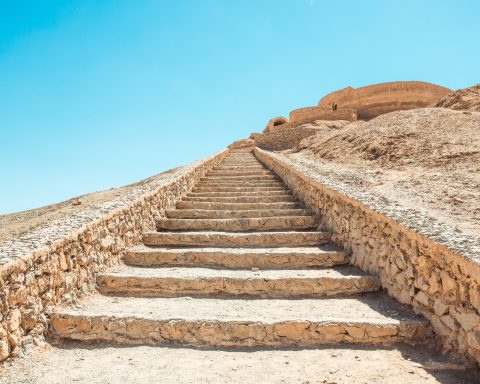
“For where your treasure is, there will be your heart also.” -Luke 12:34
“Unfortunately, that is the cost of doing business in our world.” -A clergy colleague’s response to the church divesting from Wall Street
In all my years in the Reformed church, I have been fascinated by our unexamined worship of the capitalistic cultural influence surrounding the words “good stewardship.” As a pastor, one regularly hears terms in church finance circles like planned giving, returns on investments, assets, the church’s portfolio, the church’s property, dipping into principle, precedents, annual financial reports, corporate standards and fiduciary responsibility. These are discussed with nary a critique and are epidemic in the church as a whole. This capitalist model for the church has created a structure of polarity and power dynamics that emphasize success in relationship to numbers.
Often our use of the term “good stewardship” is a subtle form of nationalism creeping into worshiping communities – an assent to the state religion of capitalism. And yet, there is rarely a systemic critique of its spiritually deteriorating influence on the mission of those led by the Spirit.
With the most recent downturn in the US economy, a veneer has been ripped away from the illusion that capitalism has a moral center. Ardent activists who had previously looked toward reforming capitalism’s abuses have awakened from a stupor and are now peeking into the system’s unequal profit mechanisms. It will take significant denial to continue to affirm the morality of our current system.
 In recent years we have witnessed mortgage-backed securities, insider trading, obscene corporate pay structures, derivatives, bank bailouts and massive deregulations. We’ve watched fraudulent foreclosures, student loan officer kickback scandals, the humanization of corporations, 50% of the population under the poverty level (click here for in-depth analysis) and foreign companies seizing property by imminent domain for pipelines. Our time has been characterized by corporate espionage, collusion of homeland security with corporations and lukewarm politicians who are paid for by the highest bidder. The question for followers of Jesus Chris is no longer when to reform, but how to reject this immoral system.
In recent years we have witnessed mortgage-backed securities, insider trading, obscene corporate pay structures, derivatives, bank bailouts and massive deregulations. We’ve watched fraudulent foreclosures, student loan officer kickback scandals, the humanization of corporations, 50% of the population under the poverty level (click here for in-depth analysis) and foreign companies seizing property by imminent domain for pipelines. Our time has been characterized by corporate espionage, collusion of homeland security with corporations and lukewarm politicians who are paid for by the highest bidder. The question for followers of Jesus Chris is no longer when to reform, but how to reject this immoral system.
___________________________________________
With the most recent downturn in the US economy, a veneer has been ripped away from the illusion that capitalism has a moral center. It will take significant denial to continue to affirm the morality of our current system.
___________________________________________
There is no possibility of abundant life in the midst of such corruption; it is replaced with cynical nihilism or the paralyzed, complacent sinfulness of those who do not have the faith to combat the evil in our midst. We must be the catalyst for new relationships with our neighbors. Instead of fully-formed ideological systems, we need to be guided by relationships, collaboration and equality. These values, we pray, will keep our eyes on total freedom for all humanity.
We are called to participate in the intended trajectory for Christ’s body, to move the church toward a just, merciful, loving, peaceful and gracious community. This body is to be a community of service, not one of paternalistic command. A humble community, with one ear listening to the ancient wisdom of holy texts and the other poised to act on the leading of the Spirit in the world. Salvation does not come from individuation in community but rather becomes possible through the transformation of the community itself, through healing, repentance and wholeness.
Justice Questions About Church Economics
 There are many assumptions about church stewardship that will be challenged as the Spirit exposes our corruption by capitalism, both as individuals and as the church. Here are three that my community has already identified through the Spirit.
There are many assumptions about church stewardship that will be challenged as the Spirit exposes our corruption by capitalism, both as individuals and as the church. Here are three that my community has already identified through the Spirit.
1.) How is it just for institutions created to follow Christ to have massive amounts of assets invested in Wall Street?
For almost a century, wealth and power have been given to local, regional, national and educational institutions’ investment in the mechanisms of modern capitalism with little to no examination from the church. For years we have listened to finance committees based on business, banking and crassly capitalistic ideology bully us – decently, of course, and in order – into thinking this is “good stewardship.” Banks and investment strategists tell the church what good stewardship is rather than the church itself discerning what the Spirit would have us do. A lack of transparency and accountability in our systems has been staggering and corrosive. Billions of dollars have gone to investments that we can hardly name, much less morally justify in our local faith communities. Someone “out there” has been our moral proxy of finances.
___________________________________________
With entire neighborhoods closing in Detroit and elsewhere, is it truly ethical to hold onto cash while we watch our neighbors flounder?
___________________________________________
As groups claiming to be non-profits, how can we accumulate massive assets based upon long-term returns on investments and continue to claim they are not profits? We steadfastly hold to the notion that these returns on investments can be used for “mission” (which often translates into operating expenses), yet a large percentage of our capital over the years has been the accumulation of wealth, not individual giving. Are there compelling reasons, aside from fear, security, tradition and survival, for locking away assets? In the face of the holy writ, wouldn’t redistribution of those coffers in terrible economies be the stewardship that relies more deeply on faith?
 2.) How do we continue to pray the Lord’s Prayer without engaging in a society that is being overwhelmed by unjust usury and fraudulent debt?
2.) How do we continue to pray the Lord’s Prayer without engaging in a society that is being overwhelmed by unjust usury and fraudulent debt?
It is beyond reproach that the community of faithful has often remained silent in the face of student, mortgage, healthcare, payday lending and credit card debt. These have been historic avenues of regulation for the church in its history (see the writings of Thomas Aquinas, documents from the Fifth Lateran Council, and the sermons of Martin Luther), but in our current climate of laissez-fair theology, there is an arrogant sanctimony against debt .This runs counter to a Biblical understanding of debt. Micah, Jesus, Leviticus, Paul, Genesis and Luke begin to give us a much deeper alternative to possessions than than that of the idolatrous capitalism of our time. It is telling that we are being reminded of our theological and scriptural roots by a new generation of activists who call their programs on debt buying “Jubilee”. If we claim to be listening for the Spirit in our time, issues of debt must be addressed directly and prophetically.
3.) How can there be such great inequality in work, pay, healthcare, education and fresh food when our church memberships so often contain people of great power and influence?
 How can such great inequality still exist? Is it due to a lack of collective will on our part? Is it because we lack the faith to dream and vision a world that destroys these sinful inequalities that we rather systematically perpetuate them? From our unrepresentative judicatory power structures to our unjust payment practices, from our lack of representation in higher education to our lack of parity on pay levels and access to employment benefits, we have a long way to go toward an open conversation about work and equality, even within our own church walls.
How can such great inequality still exist? Is it due to a lack of collective will on our part? Is it because we lack the faith to dream and vision a world that destroys these sinful inequalities that we rather systematically perpetuate them? From our unrepresentative judicatory power structures to our unjust payment practices, from our lack of representation in higher education to our lack of parity on pay levels and access to employment benefits, we have a long way to go toward an open conversation about work and equality, even within our own church walls.
It is clear that courting people of influence has been a net loss for the Protest/ant church in its quest for equality, transparency and true democratic reform. It is time to take to the barricades of these old institutions and rattle them free from their historical stupor.
Faith must be much more than a spreadsheet, deeper than a strategy or program and more substantive than the isolating American individuality of our culture. Our faith must be the understanding that what we believe can transform the world.
Alternatives
There are many thoughts going into alternative, communitarian societies that are not based on success, productivity and profitability. These emerging communities are arising partially out of economic necessity and partially out of a rethinking of old values in our new, post-capitalistic context. Here are a few that have begun to bubble up to the surface in recent years.
Our awareness has be raised regarding the backstory of our food and the terrible ecological toll its commerce has taken on our planet. Many, admittedly of a certain privileged class, have discovered that moving toward local, organic and farm fresh produce is beneficial both for the environment and for person health. Yet a deeper analysis of food deserts does not allow us to stop at just paying more for our own fresh produce. There are many urban neighborhoods where there is simply no access to fresh produce at all. In this context, community gardens, guerrilla gardens, sliding scale CSA’s and pay-it-forward produce stands are beginning to highlight opportunities for the future hunger ministries of our churches.
2.) Rethinking Assets
Discussions are emerging amongst a new generation of the faithful about the hoarding of assets. With entire neighborhoods closing in Detroit and elsewhere, is it truly ethical to hold onto cash while we watch our neighbors flounder? The reallocation of funding for community-based projects is an essential need in our communities. With banks refusing loans to small businesses, we as individuals and as the church have the opportunity to reinvest our money back into our communities and out of a disreputable stock market.
___________________________________________
It is essential that we do not look at our faith as something that merges with existing systems of power and money. There may be occasions where our paths run parallel, but they must not lock step.
___________________________________________
A desire is also emerging to help our college students from the indentured servitude of debt and student loans, and cut through credit card companies’ exploitative usury on our friends and neighbors. Here again is an opportunity for the church to reinvest in people and not banks.
Finally, payday lending is an abominable scourge in our poor communities. An intentional church could help those who would otherwise turn to predatory payday lenders through establishing community credit unions or lending programs. This would exponentially help those who have no access to bank accounts and live paycheck to paycheck.
Through hurricanes Katrina and Sandy, a new emphasis emerged on an old anarchist principle: the idea of mutual aid. It cut through the red tape that is prevalent within so many churches and organizations. This is a serious challenge to top-down structures. Many have argued that these groups of decentralized organisms have been far more effective, touching people on the ground with an immediacy lacking in our conglomerate non-profits. It is well past time for a study of these movements and a humble willingness to give away authoritarianism in the midst of tragedy.
Final Thoughts and Trajectories
Do we need to build alternative economies? I leave that question to the reader. If the church is truly functioning as a community of friends of Jesus, it will already be an alternative economy. And not an alternative alone, but a two-edged sword to combat the corruption and futility of the capitalism of this age.
___________________________________________
Salvation does not come from individuation in community but rather becomes possible through the transformation of the community itself, through healing, repentance and wholeness.
___________________________________________
It is essential that we do not look at our faith as something that merges with existing systems of power and money. There may be occasions where our paths run parallel, but they must not lock step. We must remain free to analyze the principalities, powers and rulers of this age. To court the inside of that power is to anesthetize ourselves to the darkness and evil it may contain. Too often we worry about advocacy for existing rights without having a vision of freedom informed by a yearning for the divine. It’s time to locate the sources of our faith and develop trajectories to begin a collaborative transformation of all our communities. Stasis brings death; only the powerful yearning of all creation in response to the Spirit can bring redemption. It is time to believe that the old has passed away and the new has truly come.
 AUTHOR BIO: Rev. Brian Merritt is the evangelist for East Tennessee presbytery and founder of Mercy Junction. Before that he was senior minister at The Palisades Community Church in Washington, DC. Brian has been active in Occupy DC as the protest chaplain and currently works with Occupy Chattanooga and the Home Defenders League. He currently holds the Presbyterian Peace Fellowship’s steering committee position for Christian Peacemaker Teams.
Brian has served in pastorates in South Louisiana and Washington, DC. During his time in ministry he has served on the board of trustees for the International Council of Community Churches, Assembly Member and founding member of the Justice Team for the Interfaith Conference of Metropolitan Washington, Organizer of the People’s Prayer Breakfast, chair of the Social Justice Committee of National Capital Presbytery, Chair for the Committee on Grants and Loans for the Synod of the Northeast, Presbyterian Representative for the Rhode Island Council of Churches and Moderator for Presbyterian Promise.
AUTHOR BIO: Rev. Brian Merritt is the evangelist for East Tennessee presbytery and founder of Mercy Junction. Before that he was senior minister at The Palisades Community Church in Washington, DC. Brian has been active in Occupy DC as the protest chaplain and currently works with Occupy Chattanooga and the Home Defenders League. He currently holds the Presbyterian Peace Fellowship’s steering committee position for Christian Peacemaker Teams.
Brian has served in pastorates in South Louisiana and Washington, DC. During his time in ministry he has served on the board of trustees for the International Council of Community Churches, Assembly Member and founding member of the Justice Team for the Interfaith Conference of Metropolitan Washington, Organizer of the People’s Prayer Breakfast, chair of the Social Justice Committee of National Capital Presbytery, Chair for the Committee on Grants and Loans for the Synod of the Northeast, Presbyterian Representative for the Rhode Island Council of Churches and Moderator for Presbyterian Promise.
Read more articles in this series.








Unbound Social